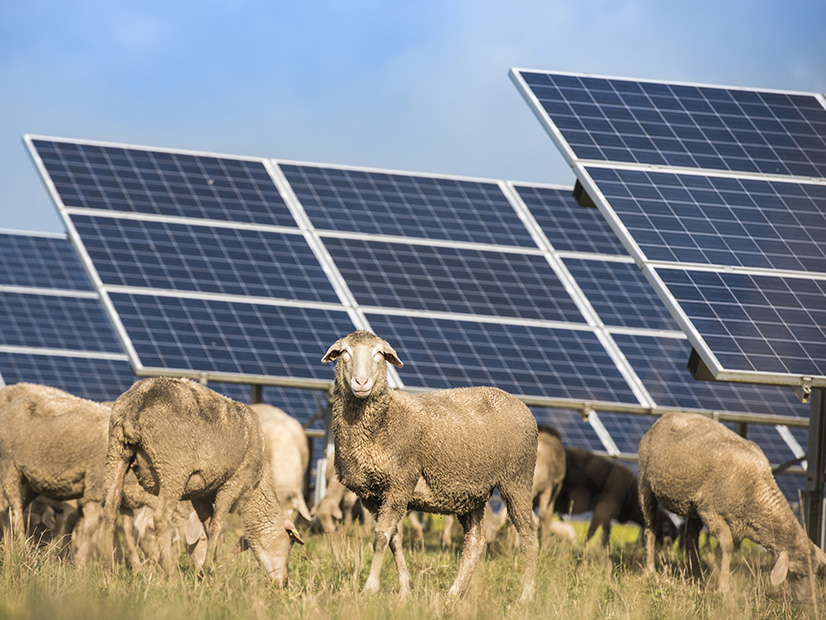New Jersey’s Board of Public Utilities has released its long-awaited dual-use solar proposal designed to incentivize 200 MW of capacity in a three-year pilot program, with the first solicitation of the pilot to be launched in the middle of 2024.
The proposal anticipates the first project selection taking place in the fall of 2024 with the award of 30 MW of dual-use capacity. The proposal, which was released Nov. 10, calls for the award of 70 MW in the second year and 100 MW in the third year.
“Lessons learned from the pilot program and relevant research are intended to serve as the basis for the development of a permanent dual-use program,” the proposal says. And the pilot could be extended by two more years if necessary.
The BPU will hold a public hearing on the dual-use (also known as agrivoltaics) proposal Nov. 29 and will accept written comments until Dec. 13.
The proposal comes amid concerns in New Jersey, as in other states, that farmland could be lost to solar projects as struggling farmers find clean energy more lucrative than cultivating the land. Farms in New Jersey are under pressure as the development of residential and warehouse projects encroaches on rural areas, and dual-use projects are a way to combine farming and solar use, and so preserve farmland. (See NJ Solar Push Squeezes Farms.)
“Dual-use solar can provide farmers with an additional stream of revenue, contributing to farm financial stability and allowing for continued agricultural or horticultural production of land while increasing the production of clean energy,” the proposal states.
The New Jersey Agricultural Experiment Station (NJAES) and Rutgers University are midway through a $2 million study into the effect on crops and animals of solar projects and farming co-existing at three sites around the state. (See NJ’s $2M Agrivoltaics Study Advances.) The Rutgers Agrivoltaics Program helped design the BPU’s pilot proposal.
To protect farmland, the proposal requires dual-use pilot projects to be located “only on lands that have had at least three most recent years of continuous agricultural or horticultural use.”
The plan also requires that land hosting a dual-use project continue to be used for agriculture or horticulture and that projects include “a method of ensuring that the presence of the solar electric generation equipment does not result in a substantively negative change or reduction in the quality of the land that would impair its agricultural or horticultural usage.”
“Staff proposes that any pilot program participant that does not maintain active agricultural or horticultural use of the land would risk forfeiture of future dual-use incentive payments,” the proposal states.
Size Diversity
The pilot is based on the guidelines for an agrivoltaics program in the state set out in a bill signed by Gov. Phil Murphy (D) in July 2021. The bill, A5434, required that the BPU, in consultation with the New Jersey Department of Agriculture, adopt rules and regulations for the pilot program within 180 days, or by the end of January 2022.
The proposal provides incentives for dual-use solar projects in the form of New Jersey Solar Renewable Energy Certificate under the state’s Successor Solar Incentive (SuSI) program. So the incentives for dual-use projects smaller than or equal to 5 MW would be set administratively by the BPU and incentives for projects greater than 5 MW would be determined by a solicitation held under the Competitive Solar Incentive part of the SuSI program.
BPU staff suggests the state limit dual-use project sizes to 10 MW, but adds that if several projects of the maximum size are proposed, the agency should select projects that provide a variety of size, location or interconnection points.
It adds that a minimum size of project may be needed because smaller projects likely would not offer much helpful information that could be used in the program evaluation.
The projects also will be judged on the developer’s plan for the project at the end of its life cycle, the proposal states.
“Staff envisions the evaluation of pilot project proposals will take into account the extent to which applicants plan to follow an established set of guidelines or best practices that facilitates farming following decommissioning,” the proposal states.



